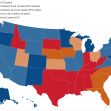The Pain-Capable Unborn Child Protection Act (PCUCPA) is a bill in Congress that would ban abortions after 20 weeks gestation. The bill says that fetuses in the womb are able to react “to stimuli that would be recognized as painful if applied to an adult human, for example, by recoiling.” In 2016, President Trump signed a letter to antiabortion leaders promising to support this act. However, since Roe v. Wade was overturned in 2022, Trump is now leaning toward not passing this federal ban and leaving it to the states.
The National Right to Life Committee’s Department of State Legislation drafted a version of this bill that was enacted in Nebraska in 2010. In 2010, medical evidence revealed that fetuses could feel pain at 22 weeks gestation. Now, with more research, it has been found that fetuses can feel pain at 15 weeks gestation. On the national level, the bill has been introduced in the House and Senate in five separate sessions of Congress since 2011-2012. It was last introduced in the 2021-2022 legislative session, where it was immediately referred to the House Judiciary Committee and never made it out of committee.
“The Pain Capable Unborn Child Protection Act will protect the voiceless, the vulnerable, and the marginalized," then-House Majority Leader Kevin McCarthy, R-California said in a statement in 2017. "It will protect those children who science has proven can feel pain, and give them a chance to grow and live full and happy lives. We have an obligation to speak and defend for those who can't speak for themselves."
According to the National Right to Life Committee, “13 states protect the unborn child at 22 weeks gestation; 3 states protect the unborn child at 20 weeks gestation; 2 states protect the unborn child at 18 weeks gestation; 5 states protect the unborn child at 15 weeks gestation; 2 states have ‘cascading’ protection laws.” The NRLC credits passage of these laws to “advancements in our understanding of the pain capability of the unborn child.”
In contrast, the American College of Obstetricians and Gynecologists disputes this claim, saying that “science conclusively establishes that a human fetus does not have the capacity to experience pain until after at least 24–25 weeks.”
If the PCUCPA were to become law, performing abortions after 20 weeks would be considered a federal crime. Any doctors performing abortions after the 20-week mark would be subject to fines and/or up to five years in prison. Women who receive abortions would not be subjected to any fines or prison time.
Dr. Kristin Lyerly and Dr. Kelly Morrison are both OB-GYNs who are currently running for seats in Congress from Wisconsin and Minnesota, respectively. If elected, they would be the only pro-abortion rights OB-GYNs in Congress. Currently, Congress has two OB-GYNs, Rep. Michael Burgess, R-Texas, and Sen. Roger Marshall, R-Kan., who are strongly against abortion and in support of abortion bans. On Burgess’s congressional website, he talks about the work he did to prevent abortions at three medical facilities in Texas.
“Many Americans overwhelmingly support restrictions on late-term abortions. That’s for good reason. One Iowan, Micah Pickering, was born early at 20 weeks. Today, Micah is living proof that just 20 weeks can create a beautiful human life,” said Sen. Chuck Grassley (R-Iowa) upon reintroducing the PCUCPA into Congress in 2021. “It’s time for Congress to pass this bill and help ensure that other human lives also have a real chance.”
According to Grassley’s congressional, website. “The legislation is cosponsored by U.S. Sens. John Barrasso (R-Wyo.), Marsha Blackburn (R-Tenn.), Roy Blunt (R-Mo.), John Boozman (R-Ark.), Mike Braun (R-Ind.), John Cornyn (R-Texas), Tom Cotton (R-Ark.), Kevin Cramer (R-N.D.), Mike Crapo (R-Idaho), Ted Cruz (R-Texas), Steve Daines (R-Mont.), Joni Ernst (R-Iowa), Deb Fischer (R-Neb.), Bill Hagerty (R-Tenn.), Josh Hawley (R-Mo.), John Hoeven (R-N.D.), Cindy Hyde-Smith (R-Miss.), James Inhofe (R-Okla.), Ron Johnson (R-Wis.), John Kennedy (R-La.), James Lankford (R-Okla.), Cynthia Lummis (R-Wyo.), Roger Marshall (R-Kan.), Mitch McConnell (R-Ky.), Jerry Moran (R-Kan.), Rand Paul (R-Ky.), Rob Portman (R-Ohio), James Risch (R-Idaho), Mitt Romney (R-Utah), Mike Rounds (R-S.D.), Marco Rubio (R-Fla.), Ben Sasse (R-Neb.), Rick Scott (R-Fla.), Tim Scott (R-S.C.), Richard Shelby (R-Ala.), Dan Sullivan (R-Alaska), John Thune (R-S.D.), Thom Tillis (R-N.C.), Pat Toomey (R-Penn.), Tommy Tuberville (R-Ala.), Roger Wicker (R-Miss.) and Todd Young (R-Ind.).”
In 2022, Marshall said in a Senate committee hearing that he supports exceptions for the life of the mother, stating that “Women with miscarriages and ectopic pregnancies will be treated in every state without exception. Life of the mom will continue to be honored, and Plan B remains over the counter.”
In 2016, President Trump wrote in a letter that he was committed to signing the PCUCPA should it pass in both the House and the Senate. Now, it appears that his views on abortion are shifting.
“Many states will be different. Many will have a different number of weeks, or some will have more conservative than others,” Trump said in April. “At the end of the day, this is all about the will of the people.”
People in support of Trump say this is a good way to appear more moderate. Trump opponents say that this puts him in line with states that have more severe restrictions.






